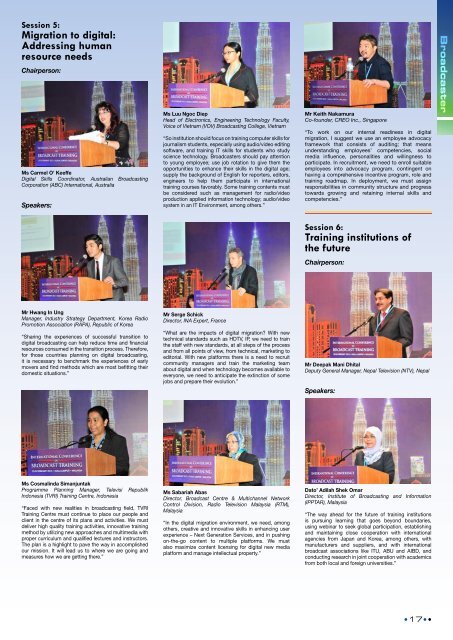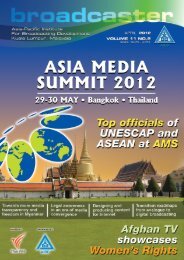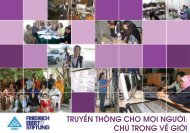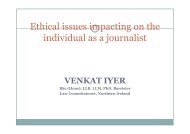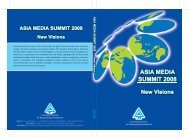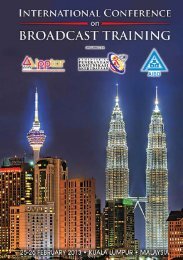Co-productions
Broadcaster 042013.pdf - AIBD
Broadcaster 042013.pdf - AIBD
- No tags were found...
You also want an ePaper? Increase the reach of your titles
YUMPU automatically turns print PDFs into web optimized ePapers that Google loves.
Session 5:<br />
Migration to digital:<br />
Addressing human<br />
resource needs<br />
Chairperson:<br />
Ms Carmel O’ Keeffe<br />
Digital Skills <strong>Co</strong>ordinator, Australian Broadcasting<br />
<strong>Co</strong>rporation (ABC) International, Australia<br />
Speakers:<br />
Ms Luu Ngoc Diep<br />
Head of Electronics, Engineering Technology Faculty,<br />
Voice of Vietnam (VOV) Broadcasting <strong>Co</strong>llege, Vietnam<br />
“So institution should focus on training computer skills for<br />
journalism students, especially using audio/video editing<br />
software, and training IT skills for students who study<br />
science technology. Broadcasters should pay attention<br />
to young employee; use job rotation to give them the<br />
opportunities to enhance their skills in the digital age;<br />
supply the background of English for reporters, editors,<br />
engineers to help them participate in international<br />
training courses favorably. Some training contents must<br />
be considered such as management for radio/video<br />
production applied information technology; audio/video<br />
system in an IT Environment, among others.”<br />
Mr Keith Nakamura<br />
<strong>Co</strong>-founder, CREO Inc., Singapore<br />
“To work on our internal readiness in digital<br />
migration, I suggest we use an employee advocacy<br />
framework that consists of auditing; that means<br />
understanding employees’ competencies, social<br />
media influence, personalities and willingness to<br />
participate. In recruitment, we need to enroll suitable<br />
employees into advocacy program, contingent on<br />
having a comprehensive incentive program, role and<br />
training roadmap. In deployment, we must assign<br />
responsibilities in community structure and progress<br />
towards growing and retaining internal skills and<br />
competencies.”<br />
Broadcaster<br />
Session 6:<br />
Training institutions of<br />
the future<br />
Chairperson:<br />
Mr Hwang In Ung<br />
Manager, Industry Strategy Department, Korea Radio<br />
Promotion Association (RAPA), Republic of Korea<br />
Mr Serge Schick<br />
Director, INA Expert, France<br />
“Sharing the experiences of successful transition to<br />
digital broadcasting can help reduce time and financial<br />
resources consumed in the transition process. Therefore,<br />
for those countries planning on digital broadcasting,<br />
it is necessary to benchmark the experiences of early<br />
movers and find methods which are most befitting their<br />
domestic situations.”<br />
“What are the impacts of digital migration? With new<br />
technical standards such as HDTV, IP, we need to train<br />
the staff with new standards, at all steps of the process<br />
and from all points of view, from technical, marketing to<br />
editorial. With new platforms there is a need to recruit<br />
community managers and train the marketing team<br />
about digital and when technology becomes available to<br />
everyone, we need to anticipate the extinction of some<br />
jobs and prepare their evolution.”<br />
Mr Deepak Mani Dhital<br />
Deputy General Manager, Nepal Television (NTV), Nepal<br />
Speakers:<br />
Ms <strong>Co</strong>smalinda Simanjuntak<br />
Programme Planning Manager, Televisi Republik<br />
Indonesia (TVRI) Training Centre, Indonesia<br />
“Faced with new realities in broadcasting field, TVRI<br />
Training Centre must continue to place our people and<br />
client in the centre of its plans and activities. We must<br />
deliver high quality training activities, innovative training<br />
method by utilizing new approaches and multimedia with<br />
proper curriculum and qualified lectures and instructors.<br />
The plan is a highlight to pave the way in accomplished<br />
our mission. It will lead us to where we are going and<br />
measures how we are getting there.”<br />
Ms Sabariah Abas<br />
Director, Broadcast Centre & Multichannel Network<br />
<strong>Co</strong>ntrol Division, Radio Television Malaysia (RTM),<br />
Malaysia<br />
“In the digital migration environment, we need, among<br />
others, creative and innovative skills in enhancing user<br />
experience – Next Generation Services, and in pushing<br />
on-the-go content to multiple platforms. We must<br />
also maximize content licensing for digital new media<br />
platform and manage intellectual property.”<br />
Dato’ Adilah Shek Omar<br />
Director, Institute of Broadcasting and Information<br />
(IPPTAR), Malaysia<br />
“The way ahead for the future of training institutions<br />
is pursuing learning that goes beyond boundaries,<br />
using webinar to seek global participation, establishing<br />
and maintaining close cooperation with international<br />
agencies from Japan and Korea, among others, with<br />
manufacturers and suppliers, and with international<br />
broadcast associations like ITU, ABU and AIBD, and<br />
conducting research in joint cooperation with academics<br />
from both local and foreign universities.”<br />
17


